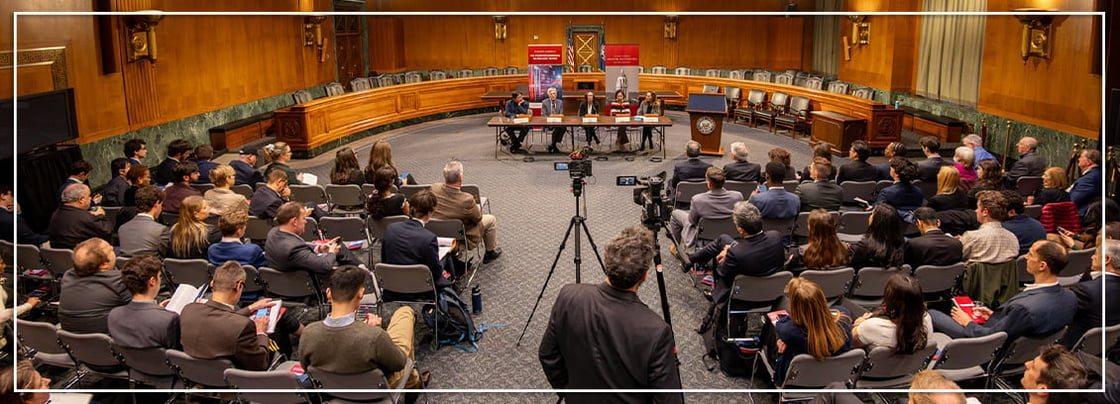Welcome to the inaugural Hoover Technology Policy Accelerator Newsletter! Our mission is to help government and business leaders better understand emerging tech and its geopolitical implications so they can seize opportunities, mitigate risks, and advance American interests and values. The Tech Policy Accelerator is moving into high gear—and we are excited to share what we've been doing and what we are building.
Today’s issue focuses on the recent launch of the 2025 Stanford Emerging Technology Review, our flagship annual report covering recent developments and over-the-horizon implications of ten critical technologies— including AI, robotics, neuroscience, semiconductors, and space.
Future editions will cover our research, policy, and educational programs in US intelligence, space, biotechnology, defense innovation, and more.
Click on the subscription link to keep up to date with our activities in this fast-changing domain.
Amy Zegart

2025 Stanford Emerging Technology Review Offers Unique View on Frontier Tech
The 2025 edition of the Stanford Emerging Technology Review report was released to the public in February, offering American policymakers a comprehensive overview of how ten frontier technologies, from artificial intelligence and biotechnology to robotics and space, are transforming the world.
A collaboration between the Hoover Institution, the Stanford School of Engineering, and the Stanford Institute for Human-Centered Artificial Intelligence, the report—based on leading research from Stanford scientists, engineers, and policy experts—serves as a one-stop primer into state-of-the-art innovations in these key domains, and what to look out for in the future.
Read more here.

SETR Highlights Promise and Risk of Frontier Tech to Washington, DC, Policymakers
Contributors to the 2025 edition of the Stanford Emerging Technology Review brought its findings to America’s capital on February 25, with the challenge and promise presented by frontier technologies now clearer than ever before.
Among the Stanford and Hoover scholars who traveled to Washington were fellows Amy Zegart, Herbert S. Lin, and Allison Okamura, and Hoover Institution Director Condoleezza Rice.
Two sitting US senators, Todd Young of Indiana and John Hickenlooper of Colorado, joined them to speak about the value of SETR as a guide for policymakers looking at how to ensure that America benefits from the promise of frontier technology.
Watch or read about that discussion here.
SETR faculty and chairs circulated the report and its findings to Washington policymakers. They spoke about the report with members of Congress and officials at the White House, including representatives from the National Security Council and the Office of Science and Technology Policy, and the President’s Council of Advisors on Science and Technology, as well as leaders and staffers at the State Department. They also held briefings at the Department of Defense and within the Intelligence Community.
On February 26, several SETR scholars, including Lin, Okamura, Zegart, and Mark Horowitz, spoke in a discussion—broadcast live online from the Council on Foreign Relations’s Washington, DC office—about the report and how it explains the connections between frontier technologies and geopolitics.
Watch a video of their discussion here.

China’s DeepSeek AI Escalates Fight to Innovate
In an op-ed at Fox News, Hoover Institution Director Condoleezza Rice and Senior Fellow Amy Zegart reflect on China start-up DeepSeek’s ability to release an open-source AI model, allegedly at a fraction of the cost and relative computing power of AI platforms from America’s leading tech companies. They write that at this moment in the global competition for leadership in frontier technology, Americans should adopt the attitude of “game on, not game over,” adding that “a principal foreign policy challenge for the nation is harnessing emerging technologies and understanding their implications faster and better than their adversaries.”
Rice and Zegart say that universities can help in sustaining America’s innovation leadership. Universities can embark on basic research projects without constraints such as product development timelines that are present in the private sector. “Research on the frontiers of knowledge with no foreseeable commercial product, like understanding quantum physics, is called basic or fundamental research. It requires years, sometimes decades, to bear fruit. But without it, commercial innovations would not be possible,” they write.
Read more here. (email registration required).
Watch Secretary Rice on Fox News Sunday, discuss the race for AI and the Stanford Emerging Technology Review.

SETR and the Council on Foreign Relations Launch The Interconnect
Hosted by Policy Fellow and SETR managing editor Martin Giles, The Interconnect is a new podcast series from SETR and the Council on Foreign Relations (CFR) that brings together leading minds in cutting-edge technology and foreign policy to explore recent groundbreaking developments, what’s coming over the horizon, and the implications for US innovation leadership.
The first four episodes are now online, covering the policy implications of frontier technologies including the intersections of robotics and AI with Science Fellow Allison Okamura and Open AI’s Kevin Weil; chips manufacturing and the future of computing with SETR Faculty Council member Mark Horowitz and CFR chief technologist Sebastian Elbaum; innovations in outer space with Science Fellow Simone D’Amico and CFR Space Task Force Project Director Esther Brimmer; and unlocking the potential of biotechnology with Science Fellow Drew Endy and CFR Senior Fellow for Global Health Luciana Borio.
Listen to all episodes here.

New Video Explainers on Biotechnology and AI
To better explain complex frontier technology to new audiences, SETR is releasing short video explainers on several of the focus technologies in the report. They are aimed at helping the informed public grasp both the potential benefits and the risks of each technology as their adoption and influence expands in society. The following are videos released to date:
“The Future of Synthetic Biology”
A recent video from SETR describes the future of synthetic biology. At the frontier of biotech innovation, synthetic biology promises revolutionary advancements in agriculture, health and medicine, energy, and more. This emerging field, however, raises significant ethical, economic, and security concerns, including around human enhancement, DNA patenting, and international competition.
Watch the Synthetic Biology video here.
“The Future of Artificial Intelligence”
This newly released video from SETR explains why the great promise of AI must be balanced with the risks of its being misused. Rapid adoption of AI in the workplace could lead to painful job displacement, for example. The use of “deepfake” video could manipulate voters or reduce already low levels of trust in institutions. Policymakers need to be sure that regulating AI doesn’t delay its benefits to society.
Watch the AI video here.

Mixed Signals and Emerging Technology with Amy Zegart
On the latest episode of GoodFellows, Senior Fellow Amy Zegart joins senior fellows Niall Ferguson and H.R. McMaster to discuss whether America has a plan for winning the competition of the future—mastering artificial intelligence, biotechnology, and space, plus other material and developmental sciences. Zegart explains how the Stanford Emerging Technology Review is a one-of-a-kind partnership between the Hoover Institution and Stanford University’s School of Engineering, which gives policymakers the tools they need to better address the challenges facing cutting-edge industries.
Watch or listen to the episode here.

Navigating the Challenges of Space with Simone D’Amico
In October, D’Amico sat down for a Q&A with Hoover’s Technology Policy Accelerator about a challenge he refers to as “the space sustainability paradox.” As we launch more and more items into space, the benefits for those on Earth multiply. But with more than 10,000 working satellites now orbiting Earth and tens of thousands more pieces of space debris tracked each day, the sheer volume of man-made objects in orbit threatens the sustainability of future use of space for humanity’s benefit.
Read here.
About Technology Policy Accelerator
The Hoover Institution’s Technology Policy Accelerator conducts research and develops insights that help government and business leaders better understand emerging technology and its geopolitical implications so they can seize opportunities, mitigate risks, and advance American interests and values.
About The Stanford Emerging Technology Review
The Stanford Emerging Technology Review helps America’s public and private sectors better understand transformational technologies so that the United States can seize opportunities, mitigate risks, and ensure its innovation ecosystem continues to thrive. The product of a major new Stanford education initiative, its clear explanation of pivotal tech domains, recent developments within them, and what to look out for in the future makes it an indispensable guide to tomorrow’s world.






















